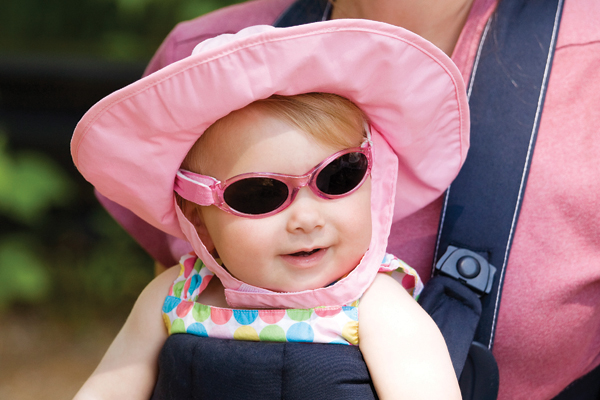Ahhh yes, my first pair of eyeglasses. I was eight years old and in the fourth grade when I began wearing prescription glasses. I still remember going with my mom to the eyeglass store to pick them out, I was so excited. Those pink plastic frames with tiny purple hearts in each corner opened up a whole new world for me, visually speaking. It was quite a significant milestone for my then fourth grade self. 🙂
Keeping your children’s eyes in tip-top shape is so important. In fact, it may come as a surprise that the American Optometric Association recommends scheduling your child’s first eye assessment at six months of age…however it’s no surprise that healthy eyes and vision are absolutely a critical part of a child’s development.
My first pair of eyeglasses had me feeling like a superstar! 🙂
In this month’s edition of “Your Health”, we visit Midwestern University’s Eye Institute in Glendale, Arizona to learn about the importance of keeping your child’s eyes healthy and at their best. I had the pleasure of interviewing the Eye Institute’s Dr. Alicia Feis who discussed ways to promote good eye health for kids. She shared some wonderful tips and advice!
A full-service eye and vision clinic, the Eye Institute houses 61 exam rooms, classrooms, specialty care areas, and optical retail services offering a wide selection of eyeglasses. Also, children ages six to twelve months can receive a comprehensive eye exam at no charge through the American Optometric Association Foundation’s InfantSEE® program. Pretty awesome!
What’s Up, Doc!
There are several types of eye doctors that specialize in various aspects of eye care and it can get a bit confusing if you don’t have a firm grasp of who does what in the eye care world. Depending on your eye health needs, this is helpful information to know if you’re looking for an eye doctor for your child, or yourself.
- Ophthalmologists are medical doctors who provide comprehensive eye care. They can provide general eye care, treat eye diseases, and perform eye surgery.
- Optometrists provide services that may be similar to ophthalmologists, but they don’t perform surgery. They provide general eye care and treat the most common eye diseases. Some optometrists specialize in kids’ eye problems as well.
- Pediatric ophthalmologists are doctors who have additional special training to treat kids’ eye problems.
- Opticians fit and adjust eyeglasses.
Children’s eyes continue to develop until they reach the age of eight, so caring for a child’s eyes in the early years is critical to help lay the foundation for good eye health that lasts a lifetime. You should aim to book a routine eye test for your child at least every two years to maintain superb eyesight. However, infants are recommended to attend routine appointments during the first year of their life.
Cover Up
Protecting your eyes from the sun at any age is no joke. However when you’re young, the lens at the front of the eye is really clear which can let even more of the damaging sunlight in. If your kiddo doesn’t already have sunglasses, get him or her some. Wearing sunglasses protects their eyes from UV rays, which can lead to cataracts later in life. The Centers for Disease Control and Prevention (CDC) recommends looking for sunglasses that wrap around the head and block as close to 100% of both UVA and UVB rays as possible.
A Colorful Plate
Be sure to brighten your child’s daily plate with lots of colorful fruits and veggies such as tomatoes, blueberries, melon, strawberries and citrus. These foods are powerhouses of vitamin C, which have been shown to reduce the risk of developing macular degeneration and cataracts. The macula is a small but dense cluster of nerve cells that sits at the back of your retina and processes the images you see, sending them to your brain for interpretation.
It’s also important to incorporate other eye-friendly nutrients into your kids’ diets such as eggs, chicken, fish and whole grains. The coldwater fish that contain the high density Omega-3 oils provide the most important fatty acid for the eyes. Among those that top the list of coldwater fish are Atlantic mackerel, cod, haddock, mahi mahi, salmon and canned light tuna.
Healthy vision is critical for our kids to read, write and even play and as parents, we can make the difference when it comes to keeping their eyes healthy and strong.
We only have one set of eyes, so let’s treat them right!
Stay healthy, my friends!
Erica Cardenas (@ericacardenas1)


 My first pair of eyeglasses had me feeling like a superstar! 🙂
My first pair of eyeglasses had me feeling like a superstar! 🙂



